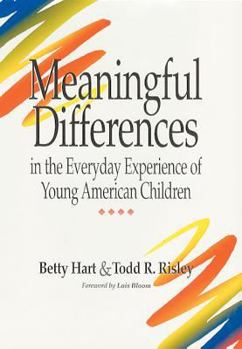Meaningful Differences in the Everyday Experience of Young American Children
Select Format
Select Condition 
Book Overview
Betty Hart and Todd Risley wanted to know why, despite best efforts in preschool programs to equalize opportunity, children from low-income homes remain well behind their more economically advantaged peers years later in school. Each month, they recorded one full hour of every word spoken at home between parent and child in 42 families, categorized as professional, working class, or welfare families. Two and a half years of coding and analyzing every utterance in 1,318 transcripts followed. By age 3, the recorded spoken vocabularies of the children from the professional families were larger than those of the parents in the welfare families. Between professional and welfare parents, there was a difference of almost 300 words spoken per hour. Extrapolating this verbal interaction to four years, a child in a professional family would accumulate experience with almost 45 million words, while an average child in a welfare family would hear just 13 million--coining the phrase the 30 million word gap.
The implications of this painstaking study are staggering: Hart and Risley's follow-up studies at age 9 show that the large differences in children's language experience were tightly linked to large differences in child outcomes. As the authors note in their preface to the 2002 printing of Meaningful Differences, "the most important aspect to evaluate in child care settings for very young children is the amount of talk actually going on, moment by moment, between children and their caregivers." By giving children positive interactions and experiences with adults who take the time to teach vocabulary, oral language concepts, and emergent literacy concepts, children should have a better chance to succeed at school and in the workplace.
Learn more about how parent and children's language interactions affect learning to talk in Hart & Risley's companion book The Social World of Children Learning to Talk.
Related Subjects
Allied Health Professions Allied Health Services Child Psychology Education & Reference Health, Fitness & Dieting Health, Fitness & Dieting Medical Medical Books Medicine & Health Sciences Mental Health Parenting & Relationships Politics & Social Sciences Psychology & Counseling Social Sciences Sociology




